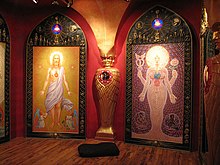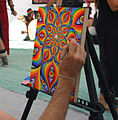Visionary art

Visionary art is art that purports to transcend the physical world and portray a wider vision of awareness including spiritual or mystical themes, or is based in such experiences.[1]
History
[edit]The Vienna School of Fantastic Realism, first established in 1946, is considered to be an important technical and philosophical catalyst in its strong influence upon contemporary visionary art.[2][3] Its artists included Ernst Fuchs, Rudolf Hausner, Arik Brauer, Wolfgang Hutter and Anton Lehmden among others. Several artists who would later work in visionary art trained under Fuchs, including Mati Klarwein, Robert Venosa,[4] Philip Rubinov Jacobson and De Es Schwertberger.
Definition
[edit]
Visionary art often carries themes of spiritual, mystical or inner awareness.[1] Despite this broad definition, there does seem to be emerging some definition to what constitutes the contemporary visionary art 'scene' and which artists can be considered especially influential. Symbolism, Cubism, Surrealism and Psychedelic art are also direct precursors to contemporary visionary art. Notable visionary artists count Hilma af Klint, Hieronymous Bosch, William Blake, Morris Graves (of the Pacific Northwest School of Visionary Art), Emil Bisttram, and Gustave Moreau amongst their antecedents.
Schools and organizations
[edit]The Vienna School of Fantastic Realism, which includes Ernst Fuchs and Arik Brauer, is also a strong influence on visionary culture. It may also be considered the European version, with the names being interchangeable.[citation needed]
The Society for the Art of Imagination, founded by Brigid Marlin serves as an important portal for visionary art events. More recently, a new wave of visionary artists collaborate to function as modern cooperatives involved in self-publishing and promotion of visionary artists through the internet and via festivals such as Burning Man and Boom Festival, and exhibition/ritual spaces such as Temple of Visions and the Interdimensional Art Movement.[citation needed]
The American Visionary Art Museum in Baltimore, Maryland, is a museum devoted entirely to visionary art.
Gallery
[edit]-
A painting by Alex Grey
See also
[edit]- Burning Man
- Fantastic art
- Horror vacui
- Outsider art
- Psychedelic art
- Surrealism
- Alex Grey
- The Symbolist and Decadent art movement
- Temples of Humankind
- Conceptual art
References
[edit]- ^ a b What is Visionary Art? by Alex Grey
- ^ "Academy of Visionary Art". Archived from the original on 2014-03-12. Retrieved 2014-01-30.
- ^ Manifesto of Visionary Art by L. Caruana
- ^ Robert Venosa biography
Sources
[edit]- Cosmic Art Ramond & Lila Piper (Hawthorne Books) ISBN 0-8015-1774-5, 1975
- Celestial Visitations The Art of Gilbert Williams (Pomegranate Artbooks) ISBN 0-517-53900-4, 1979
- Sacred Mirrors: The Visionary Art of Alex Grey", Carlo McCormick, Inner Traditions International, 1990
- Raw Creation: Outsider Art and Beyond John Maizels,ISBN 0-7148-3149-2, 1996
- The Art of Adolf Wolfli Elka Spoerri, Daniel Baumann and E. M. Gomez, ISBN 0-691-11498-6, 2003
- Nothing Is True - Everything Is Permitted: The Life of Brion Gysin John Geiger, (The Disinformation Company), 130. ISBN 1932857125, 2005
- Fantastic Art (Taschen) ( Schurian, Prof. Dr. Walter) ISBN 978-3-8228-2954-7 (English edition), 2005
- True Visions (Erik Davis and Pablo Echaurren) (Betty Books) ISBN 88-902372-0-1, 2006
- Metamorphosis: 50 Contemporary Surreal, Fantastic and Visionary Artists (beinArt) ISBN 978-0-9803231-0-8, 2007
Bibliography
[edit]- 1975 - Cosmic Art Ramond & Lila Piper (Hawthorne Books) ISBN 0-8015-1774-5
- 1979 - Celestial Visitations The Art of Gilbert Williams (Pomegranate Artbooks) ISBN 0-517-53900-4
- 2005 - Fantastic Art (Taschen) ( Schurian, Prof. Dr. Walter) ISBN 978-3-8228-2954-7 (English edition)
- 2006 - True Visions (Erik Davis and Pablo Echaurren) (Betty Books) ISBN 88-902372-0-1
- 2007 - Metamorphosis (beinArt) ISBN 978-0-9803231-0-8
- 2011 - "Positive Creations" (Schiffer Publications) ISBN 978-0-7643-3913-4
- 2016 - El Canto de Abraxas de Álvaro Robles G. (Editorial Salón Arcano) ISBN 978-987-42-2189-6
External links
[edit]- Collection: "Folk, Self-Taught, Amateur, and Visionary Art" at the University of Michigan Museum of Art


